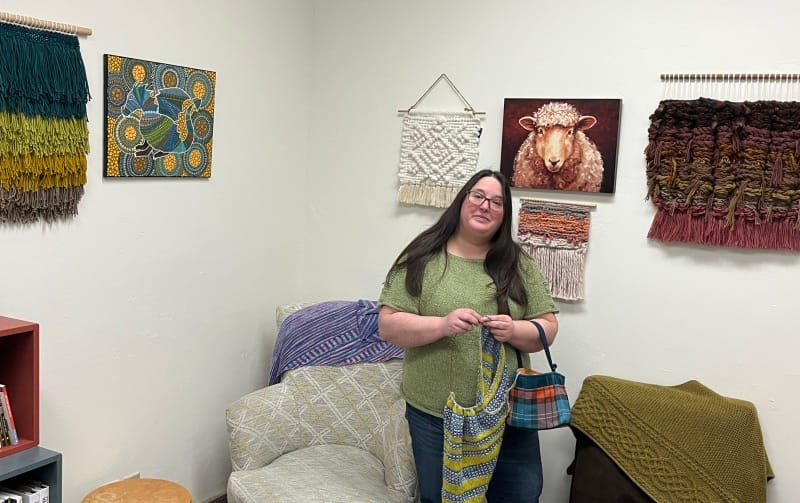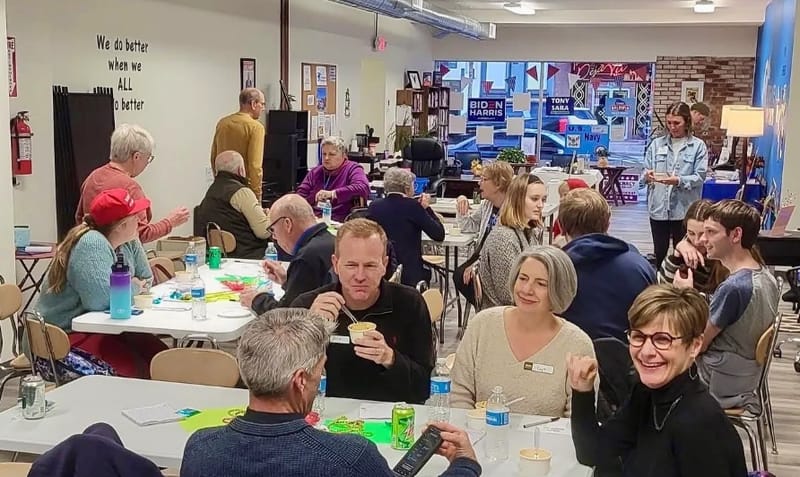Neenah yarn store owner concerned, frustrated by Trump tariff policies
Even without the full impact of the tariffs, Dorn’s business has taken a hit, as consumer confidence, driven by concern about fewer and more expensive available goods, begins to plummet and people begin to downsize.
There are a lot of drivers of stress in people’s lives, especially in these chaotic, topsy-turvy times.
The economy? Sure. Job demands? Absolutely. Toxic politics? You can’t escape it.
Peruvian wool? Umm, not so much.
But one Neenah store owner is actually worried about crates of Berroco yarn that have been on backorder for three months ever since the giant distributor posted a wildly popular pattern that created a run on their product.
Tori Dorn of Fibre on Wisconsin St. in Neenah is not worried that she’s going to get the product eventually. She’s worried whether or not those crates dock before or after Donald Trump’s tariffs go into effect. Trump imposed 10 percent tariffs on products from Peru in March, among the lowest tariffs imposed since the president launched his so-called Liberation Day that sought to bring manufacturing back to the United States by raising the cost of imported goods from nearly every country and making them less attractive to buyers.
The wisdom or foolishness of that strategy aside – and few economists believe the tariffs are going to create a manufacturing boom in the US, merely raise prices on imported consumer goods – Dorn’s primary stress is related to the uncertainty that Trump’s trade war has unleashed. The Berroco shipment status is a primary – but not by any means, only – example of that uncertainty.
There is also the ongoing on-again, off-again nature of Trump’s trade war and the sense that it was launched without much of a plan in place. Members of his administration and Trump himself have waffled since it sent the markets into a freefall, lowering some tariffs, dropping others only to put them back in place.
“I think if it wasn't the uncertainty of it and it being so wishy-washy because I have to make decisions,” she says. “Well, the companies that I get the yarn from also have to make those decisions. The manufacturing mills have to make decisions based on demand.
“Yeah, and he's just playing with everybody's emotions. It’s like being in a really bad relationship.”
A lifestyle that fosters creativity
Crocheting and knitting are fast-growing and increasingly popular hobbies. An estimated 45 million Americans claim to be enthusiasts and that includes a lot of younger people starting with Gen Z. Nearly one-third of Americans visit a yarn shop once a month. The Covid shutdowns played a role in its growth for obvious reasons. It is not just that it’s something you can do at home and by yourself, it’s that its immersive and rhythmic nature is notably therapeutic and a great stress release.
It is also something that has proven soothing for people who are on the spectrum or who have ADHD.
That was how Tori Dorn discovered it during a whirlwind phase of her life nearly a decade ago when everything suddenly changed. Dorn was undergoing a second back surgery when a friend taught her how to crochet and she loved it almost immediately.
“And for brief moments of time, I finally wasn’t thinking about the constant pain in my back,” she says. “I thought, oh my gosh, this is saving my mental health. And during my recovery at home I just really fell into the world of crochet.”
At the same time she started going on Twitch for Crochet. Twitch is an online streaming community primarily for video game players but which has branched into just about every niche imaginable. Not only did Dorn grow increasingly adept at her new craft, she developed an online relationship with a Scotsman named Mark through Twitch Crochet.
About that time, Kimberly Clark, where Dorn had worked for 11 years, began offering voluntary severance packages. Dorn had a business degree with an emphasis in entrepreneurship and had always wanted to open a business.
“And, yeah, so I pressed the button and said, ‘I’m leaving,” she says. “I got 22 weeks (severance) and I took eight weeks off to go to Scotland and the only reason I came back is because my son said he was getting sick of taking care of the house.”
While in Scotland visiting Mark (Mark has since moved to Neenah and the two are married) she fell in love with the little shops that festooned the small villages, taking special note of the yarn stores. Some were one-woman owners and Dorn realized that not everything has to be a big corporate-owned place. And you don’t need a million dollars to start.
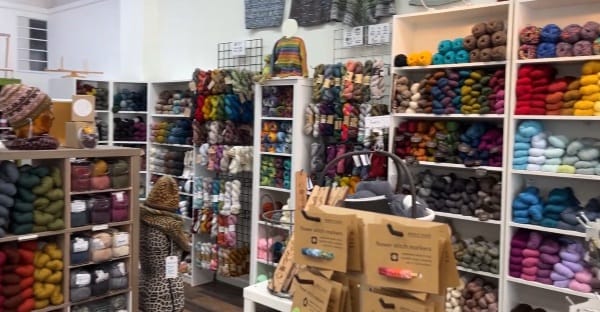
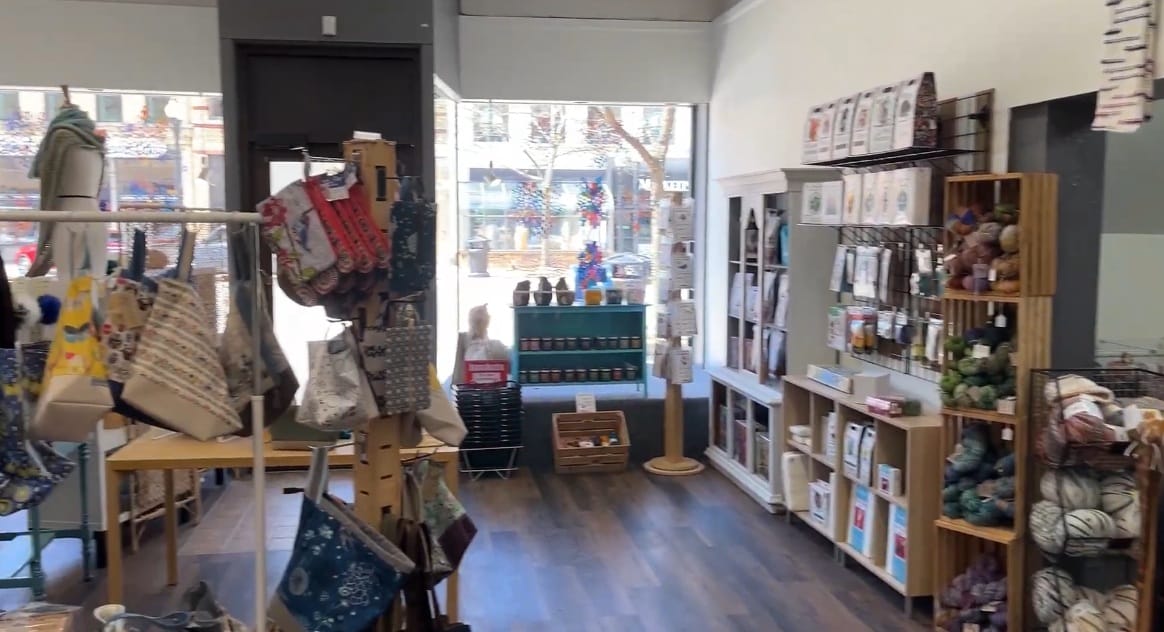
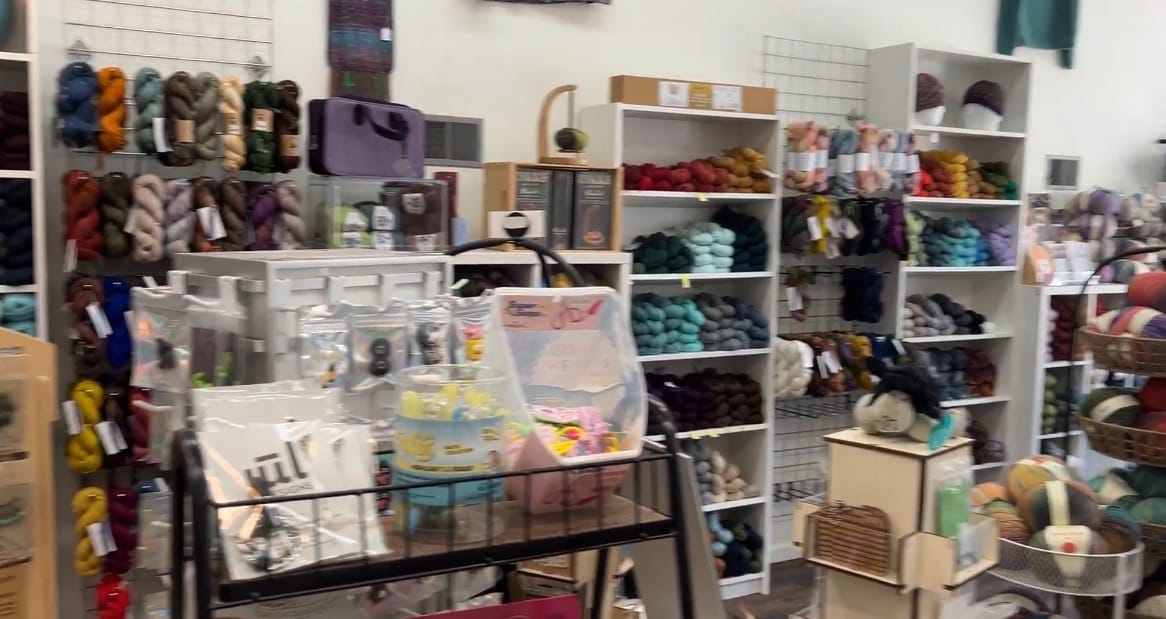
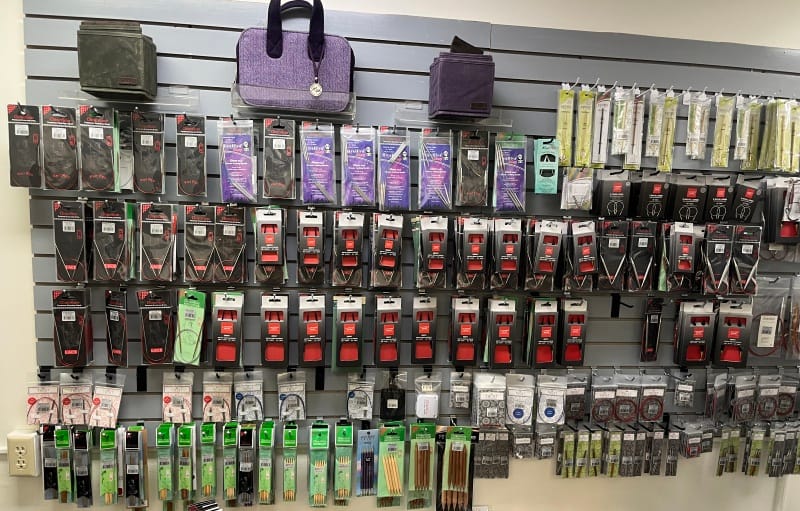
Plus, Neenah needed a yarn shop. She signed a six-month lease for a small space in the back of a travel agency in 2018 while continuing to work another full-time job. When Covid hit she moved across the street into an 1100-square foot shop in The Marketplace. It didn’t take Dorn long to outgrow that space and since fall of 2023, she has occupied a charming spot at 121 W. Wisconsin, nestled among boutique shops and restaurants.
In the back of a shop is a room she calls The Snug where people can sit in comfortable chairs and work on their projects. Behind that is a small studio where artist Katie Boland creates elaborate works. Some of her weavings decorate the walls of The Snug.
It is a warm and inviting shop and a thriving business, though as Dorn is quick to point out, no one in the yarn shop business is in it to get rich. Rather it is a lifestyle that fosters creativity, community and a sense of well-being. The crochet and knitting world and business revolves around quality-of-life, not making a lot of money.
“I think even people who don’t knit like coming in because they appreciate all the colors and it’s just kind of a calm space,” Dorn says. “And in The Snug – it’s a very British word – on Wednesday afternoons or Friday nights or anytime the shop is open, people can come in and hang out and knit or crochet.”
‘We’re not a necessity’
Dorn recognizes that no one really needs a shop like hers. She understands that during a time of penny-pinching or if prices were to rise – due to tariffs, for instance – the yarn world will suffer.
A fellow shop owner recently told Dorn about ordering $2,000 worth of yarn from Europe. Most of that came from China. With Trump’s imposition of 145 percent tariffs, a $500 customs fee and $500 for shipping, that order suddenly cost the shop owner $5,500. Dorn explains that most shops operate with an MSP (manufacturer’s suggested price) markup of 50 percent. In the example above, Dorn points out, a $10 item in that order would normally be marked up to $20 retail but with all the added costs that $20 item, with the 145 percent tariffs, would cost $55.
And with Chinese products, the de minimis exemption doesn’t apply. (De minimis is an exemption on tariffs for any order under $800 due to the fact that the negligible intake for the government barely outweighs the administrative costs). One of the ways around the tariffs for companies that can manage it is to place orders under the $800 de minimis threshold. But Trump waived that exemption for Chinese goods.
Even without the full impact of the tariffs, Dorn’s business has taken a hit, as consumer confidence, driven by concern about fewer and more expensive available goods, begins to plummet and people begin to downsize. Ironically, the mere expectation of inflation by consumers, who in a recent poll feared it reaching 6.5 percent this year, can fuel that inflation as businesses begin to build it into their pricing.
“People are paying more for groceries, clothes and basic necessities,” Dorn says. “And their yarn budget is shrinking. This is one hundred percent discretionary income. We’re not a necessity. And we have a few people on a fixed income and now something they might have splurged on for $20, they’re probably not going to splurge on if it’s $30 or $40.”
Dorn still enjoys a brisk business but the growth she saw year over year since 2018 has suddenly stagnated. Her February and March numbers were down from February and March of 2024. People are “stash diving,” she says, using a term familiar to the community that refers to knitters and crocheters using yarn they have saved up when starting a new project rather than spending money on new yarn in colors they might prefer to use on that project.
That means Dorn has more material tied up in inventory as well as ever increasing rent.
And while Dorn employs only two people, both part time, one depends on his job to be able to pay his rent.
Dorn says that all of this will impact her decisions at the H and H handicraft trade show in Chicago this week.
“I’m looking over all the vendors and thinking, will this fit into my shop right now?” she says. “Is this going to be something people are willing to pay for? I’m probably not going to be bringing in expensive cashmere or camel or yak yarns or something like that.”
It’s not just yarn, of course. Trump’s 25 percent steel and aluminum tariffs are sure to impact the cost of knitting and crochet needles. While one can last a lifetime, most knitting and crochet enthusiasts like to have multiples on hand for working on several projects at once.
“Prices are going to … start going up’
Dorn says as much as she’d love to see her product manufactured in the United States, it’s just probably never going to happen. She points to the Courtney Woolen Mills in Appleton that just closed after 144 years as an example.
“It’s gorgeous old machinery but it’s just so expensive to run,” she says. “And we don’t do acrylics over here. I tell customers all the time, if we only had US-based products here we would be maybe a fourth of the size and every yarn shop would be exactly the same. Probably three-fourths of the yarn shops would have to close.
“That’s why people go traveling to Scotland and Ireland and Finland and even Asia,” she says. “There’s just such a rich history of knitting and fiber over there.”
Dorn hopes that Trump decides on and sticks with something, if only so she and her suppliers can make plans and she can communicate with her customers, who remain devoted to her business, about what to expect.
“We are a community space,” she says. “It's not just one-hundred percent retail. You know, we're not just here to sell you products. Yes, that's what pays our bills, but we're a community space. We're a third space. I want to treat this as, like, you need to get out of your house. You're stressed out at work. Come here and escape.
“But really, my issue is communicating with the customer. I want to talk to the community about it, versus raising prices and not really talking to them about what's going on. This week I had everything written the day that Trump said, oh, 90-day pause.”
What Dorn really doesn’t want to do is stress out her customers but she knows she needs to prepare them, she says.
"The next time I do a reorder, prices are going to have to start going up,” she explains. “Because my next reorder is going to be 10,15, 20, 25 percent more for me, and it's going to end up costing me money. And I can't just eat that.”


